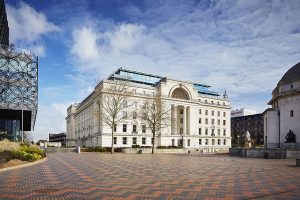Midlands Engine can be beneficiary of Brexit fall-out, MIPIM hears

LEADING figures in the Northern Powerhouse and the Midlands Engine have come together to call for the delivery of measures to boost productivity, close the skills deficit and for the updating of the “antiquated rail network” in the regions.
A panel discussion entitled the Devolution Revolution took place at the national property conference MIPIM UK, taking placed at London’s Olympia exhibition centre.
Liz Pearce, chair of Midlands-based Curzon Urban Regeneration Company, joined Manchester City Council chief executive Sir Howard Bernstein and chair of the Liverpool City Region Combined Authority Phillip Davies in a debate on the challenges and opportunities in post-Brexit UK.
Ms Pearce made no apology for banging the drum of Birmingham.
She said: “I’m going to big up Birmingham because that’s the area I represent.”
Ms Pearce said that “one of the few good things” to come out of the Brexit was that we now have an administration under Theresa May which is more focused on developing everywhere in the UK, “not just giving places fancy handles (the Northern Powerhouse).
“But there has been a reaffirmation of the importance of infrastructure,” she went on. “We’re almost certain HS2 will be delivered, along with the Northern extensions and I agree with Phil on the importance of the cross-Pennine route.
“The silver lining of the Brexit vote is the administration understands the need to develop the regions and the infrastructure.”
Sir Howard emphasised that the issue was “not about undermining the pre-eminence of London”.
But he said there were significant challenges for the North – particularly around the issue of productivity.
“There is a gap compared to other parts of Europe and also between the North and London,” he said.
“It’s about identifying sectors of growth in city regions and driving up levels of productivity in areas such as advanced materials, nuclear informatics, digital and biotechnology.
“This is the challenge within the UK and the key to instigating a new way of trading in the UK.”
And Sir Howard underlined that if Brexit means anything “it’s about how we sort out our skills systems”.
“There are deficits everywhere,” he went on. “We need to look it as a whole, working with business, educationalists, and government and we’ve got to look at it differently. The case for devolution around skills is overwhelming.
“You can say you want to reduce economic migration and not recognise there is a fundamental problem with our skills. If that wasn’t the case we wouldn’t have all the people coming and taking the jobs.”
Mr Davies agreed with Sir Howard and added: “The Brexit vote showed there are many communities that feel left out of the economic mainstream. We need to find ways to engage people. Yes, skills is a big one.”
He said the key is “we have got to show we can deliver economic benefits on the ground”.
He pointed to projects like Peel’s Wirral Waters which show opportunities were being taken.
“We’ve got the powers , we’ve got the funding, now it’s time to deliver,” he said. “The Northern Powerhouse has to be more than a soundbite. There’s got to be capital investment in infrastructure projects in the regions.
“We’ve got the Port of Liverpool surrounded by an antiquated real system. The development of HS3 is critical to our economic future. This requires the Government to be bold and decisive in making funding available for these projects as they have down here in London.
“If we can get a high speed rail system linking Liverpool and Hull serving a population of 15 million people the North will be a major economic player.”









